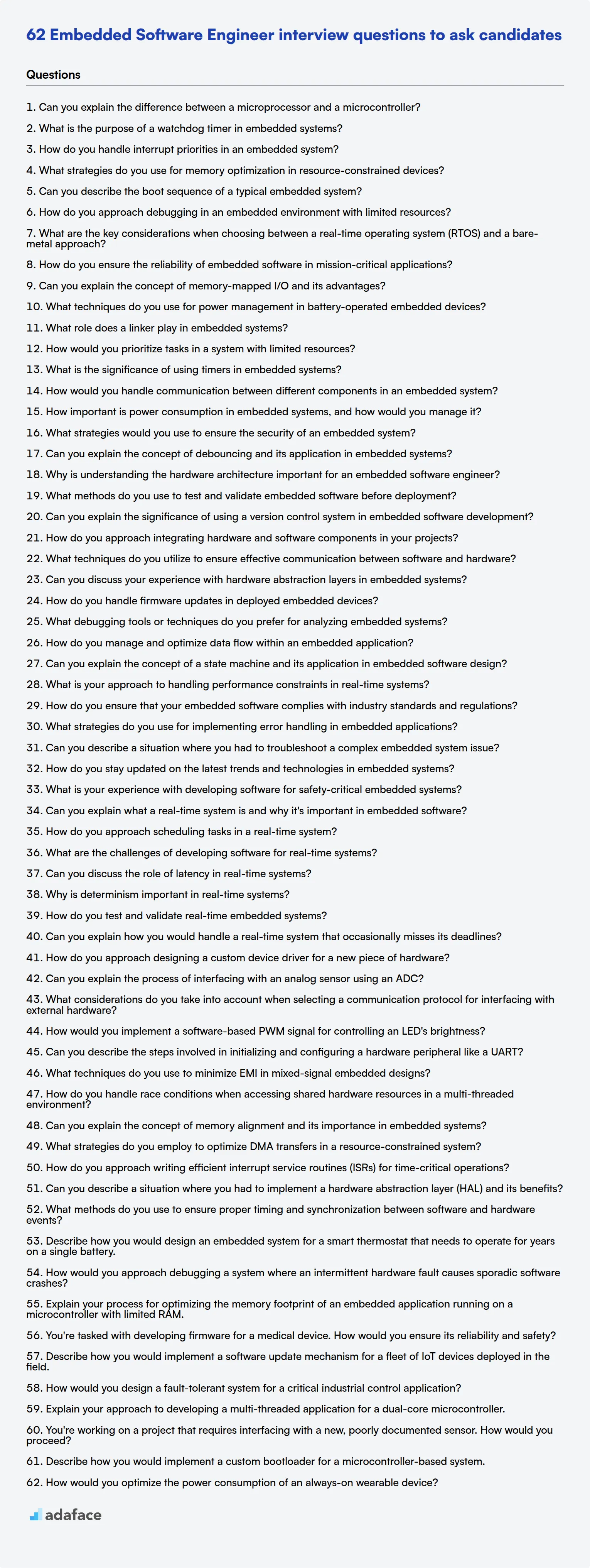Hiring the right Embedded Software Engineer can shape the trajectory of your products and your team. Understanding the skills required ensures that the candidate not only fits the role but drives innovation and efficiency.
This blog post will provide you with a well-curated list of interview questions tailored for Embedded Software Engineers at various levels of expertise. You will find questions to engage with junior to top-tier engineers, covering real-time systems, hardware integration, and situational challenges.
By utilizing this resource, you will enhance your interview process, making it more insightful and effective. Complement these questions with our Embedded C online test to comprehensively evaluate candidates before the interview.
Table of contents
10 Embedded Software Engineer interview questions to initiate the interview
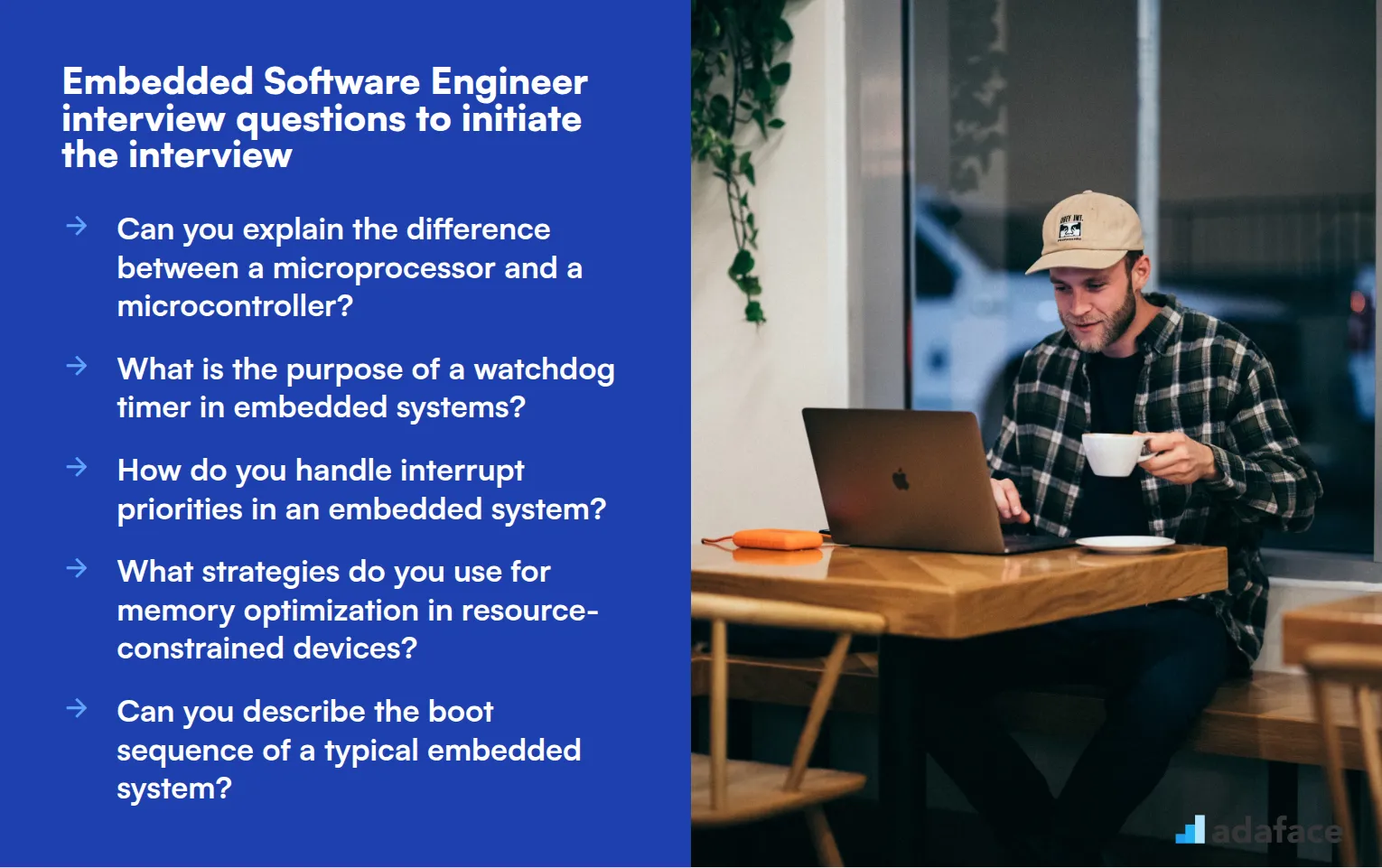
To kickstart your interview and gauge a candidate's foundational knowledge in embedded software, use these 10 essential questions. These queries are designed to help you quickly assess the applicant's understanding of key concepts and their practical application in embedded systems.
- Can you explain the difference between a microprocessor and a microcontroller?
- What is the purpose of a watchdog timer in embedded systems?
- How do you handle interrupt priorities in an embedded system?
- What strategies do you use for memory optimization in resource-constrained devices?
- Can you describe the boot sequence of a typical embedded system?
- How do you approach debugging in an embedded environment with limited resources?
- What are the key considerations when choosing between a real-time operating system (RTOS) and a bare-metal approach?
- How do you ensure the reliability of embedded software in mission-critical applications?
- Can you explain the concept of memory-mapped I/O and its advantages?
- What techniques do you use for power management in battery-operated embedded devices?
8 Embedded Software Engineer interview questions and answers to evaluate junior engineers
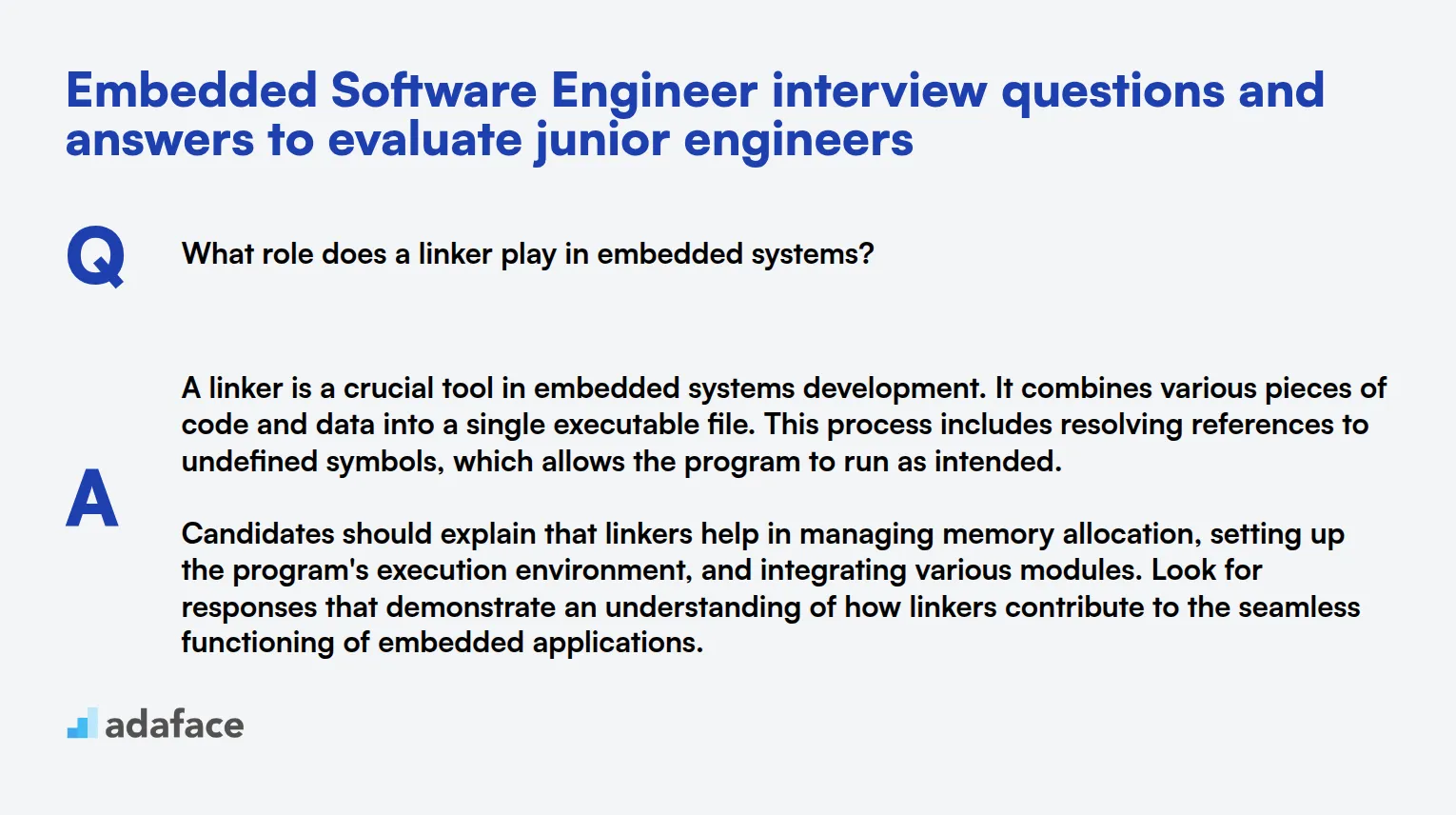
To ensure your potential junior engineers have the right foundational skills, check out these embedded software engineer interview questions. They’re designed to help you evaluate the candidate’s understanding of key concepts without diving too deep into technical jargon. Perfect for face-to-face interviews, these questions will give you a clearer picture of the candidate’s practical knowledge and problem-solving abilities.
1. What role does a linker play in embedded systems?
A linker is a crucial tool in embedded systems development. It combines various pieces of code and data into a single executable file. This process includes resolving references to undefined symbols, which allows the program to run as intended.
Candidates should explain that linkers help in managing memory allocation, setting up the program's execution environment, and integrating various modules. Look for responses that demonstrate an understanding of how linkers contribute to the seamless functioning of embedded applications.
2. How would you prioritize tasks in a system with limited resources?
In a resource-constrained environment, task prioritization is essential. Candidates should mention identifying critical tasks that must run immediately to avoid system failure. Tasks are often prioritized based on urgency and importance.
Look for candidates who can explain the trade-offs between different tasks and how they would manage system loads, potentially referencing methods like pre-emptive scheduling or using priority queues. An ideal candidate will show an understanding of balancing resource allocation while maintaining system reliability.
3. What is the significance of using timers in embedded systems?
Timers are essential in embedded systems for managing time-related tasks. They help in triggering periodic events, measuring time intervals, and generating precise time delays, which are crucial for tasks like data sampling and communication.
Candidates should be able to discuss different types of timers, such as hardware and software timers, and how each is used in various scenarios. An ideal response will highlight how timers enhance the system's efficiency and reliability by ensuring timely task execution, possibly linking to embedded software engineer skills.
4. How would you handle communication between different components in an embedded system?
Communication between components in an embedded system can be managed through various protocols and interfaces, such as UART, SPI, or I2C. These protocols help in data exchange and synchronization between system components.
Candidates should describe the pros and cons of different communication methods and how they ensure data integrity and efficiency. An ideal candidate will demonstrate knowledge of choosing the right protocol based on system requirements and constraints.
5. How important is power consumption in embedded systems, and how would you manage it?
Power consumption is a critical factor in embedded systems, especially in battery-operated devices. Managing power effectively extends the device's operational life and reduces energy costs.
Candidates should mention strategies like using low-power modes, optimizing code, and minimizing unnecessary operations to conserve energy. Look for responses that show an understanding of balancing performance with power efficiency, as this is crucial in designing sustainable embedded solutions.
6. What strategies would you use to ensure the security of an embedded system?
Securing an embedded system involves protecting it against unauthorized access and potential threats. Strategies include encrypting data, using secure boot processes, and implementing authentication protocols.
An ideal candidate will discuss the importance of regular updates, security audits, and using hardware features like Trusted Platform Modules (TPM) to enhance security measures. The ability to adapt to evolving security threats and maintain system integrity is key.
7. Can you explain the concept of debouncing and its application in embedded systems?
Debouncing is the process of removing unwanted noise or glitches from signals, especially when dealing with mechanical switches. It ensures that a single action, like pressing a button, is not misinterpreted as multiple actions due to signal fluctuations.
Candidates should demonstrate an understanding of both hardware and software debouncing techniques. An effective answer will highlight the importance of debouncing in ensuring accurate input detection and preventing erroneous behavior in embedded applications.
8. Why is understanding the hardware architecture important for an embedded software engineer?
Understanding hardware architecture is vital because it allows engineers to write more efficient and compatible software. It helps in optimizing code to leverage specific hardware features and understanding constraints like processing power and memory limits.
Candidates should mention the importance of knowing how software and hardware interact and how this knowledge can lead to better system performance. An ideal answer will reflect an appreciation for how hardware considerations inform software design decisions, linking to embedded software engineer job roles.
15 intermediate Embedded Software Engineer interview questions and answers to ask mid-tier engineers.
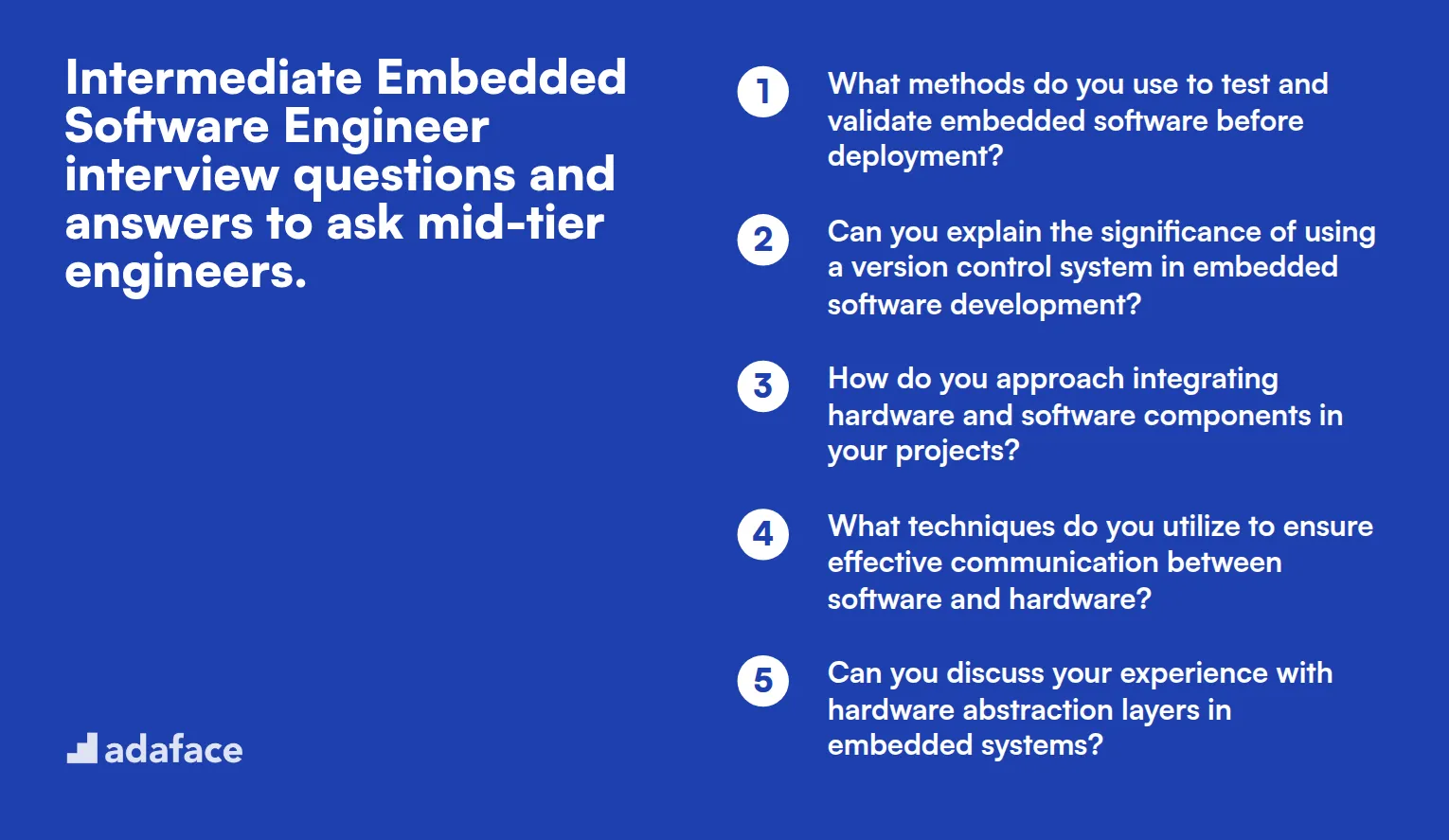
To evaluate the technical competencies of mid-tier Embedded Software Engineer candidates, leverage this targeted list of questions. These inquiries will help assess not only their understanding of embedded systems but also their ability to tackle real-world challenges in the field. For a comprehensive view of the role, you may also refer to this embedded software engineer job description.
- What methods do you use to test and validate embedded software before deployment?
- Can you explain the significance of using a version control system in embedded software development?
- How do you approach integrating hardware and software components in your projects?
- What techniques do you utilize to ensure effective communication between software and hardware?
- Can you discuss your experience with hardware abstraction layers in embedded systems?
- How do you handle firmware updates in deployed embedded devices?
- What debugging tools or techniques do you prefer for analyzing embedded systems?
- How do you manage and optimize data flow within an embedded application?
- Can you explain the concept of a state machine and its application in embedded software design?
- What is your approach to handling performance constraints in real-time systems?
- How do you ensure that your embedded software complies with industry standards and regulations?
- What strategies do you use for implementing error handling in embedded applications?
- Can you describe a situation where you had to troubleshoot a complex embedded system issue?
- How do you stay updated on the latest trends and technologies in embedded systems?
- What is your experience with developing software for safety-critical embedded systems?
7 Embedded Software Engineer interview questions and answers related to real-time systems
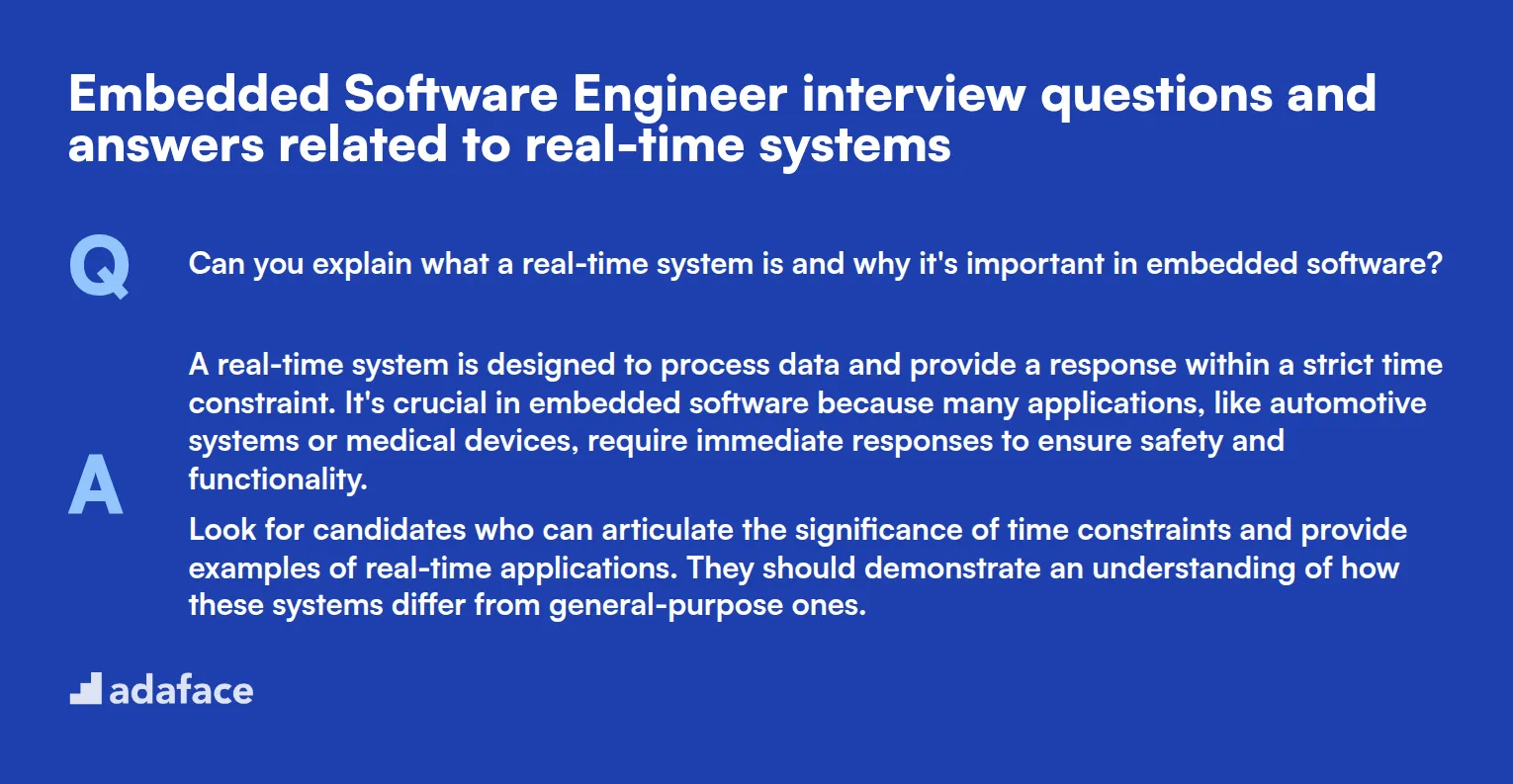
To ensure your candidates can handle the high-speed demands of real-time systems, refer to this list of interview questions. These questions will help you gauge their understanding of critical real-time concepts and their ability to keep calm under pressure.
1. Can you explain what a real-time system is and why it's important in embedded software?
A real-time system is designed to process data and provide a response within a strict time constraint. It's crucial in embedded software because many applications, like automotive systems or medical devices, require immediate responses to ensure safety and functionality.
Look for candidates who can articulate the significance of time constraints and provide examples of real-time applications. They should demonstrate an understanding of how these systems differ from general-purpose ones.
2. How do you approach scheduling tasks in a real-time system?
In a real-time system, scheduling tasks involves prioritizing based on their urgency and importance. Common approaches include rate-monotonic scheduling (RMS) and earliest deadline first (EDF). These methods help ensure that time-sensitive tasks are completed on time.
An ideal candidate will explain these concepts clearly and may provide examples of when each method is appropriate. They should show an understanding of how to balance priorities to maintain system performance.
3. What are the challenges of developing software for real-time systems?
Developing software for real-time systems presents unique challenges such as meeting strict timing constraints, ensuring system stability, and maintaining predictable performance. These systems often have limited resources, which adds another layer of complexity.
Candidates who can identify these challenges and discuss strategies for overcoming them demonstrate a solid understanding of real-time systems. Look for mentions of resource management and performance optimization.
4. Can you discuss the role of latency in real-time systems?
Latency refers to the delay between an input being processed and the corresponding output being produced. In real-time systems, minimizing latency is often critical because delays can lead to system failures or unsafe situations.
Strong candidates will understand the importance of low latency and may discuss techniques to reduce it. They should be able to explain the impact of latency on system performance, especially in time-sensitive applications.
5. Why is determinism important in real-time systems?
Determinism ensures that a system's behavior and outputs are predictable given a certain set of inputs. In real-time systems, this predictability is crucial to maintain safety and reliability, as the system must consistently meet its timing constraints.
A candidate's response should highlight the importance of predictable behavior and how it affects system reliability. They may also provide examples of real-time applications where determinism is critical.
6. How do you test and validate real-time embedded systems?
Testing and validating real-time embedded systems involve ensuring that they meet all timing and performance requirements. Techniques include stress testing, simulation, and using hardware-in-the-loop (HIL) testing to evaluate real-world conditions.
Candidates should discuss a range of testing techniques and explain their relevance to real-time systems. They should show an understanding of how to ensure system reliability and performance under various conditions.
7. Can you explain how you would handle a real-time system that occasionally misses its deadlines?
If a real-time system occasionally misses its deadlines, it's crucial to identify and address the root cause. This could involve optimizing code, adjusting scheduling algorithms, or revising system design to improve efficiency.
Candidates should discuss methods for diagnosing and resolving deadline misses, emphasizing their problem-solving skills. They should demonstrate a proactive approach to ensuring system performance and reliability.
12 Embedded Software Engineer interview questions about hardware integration
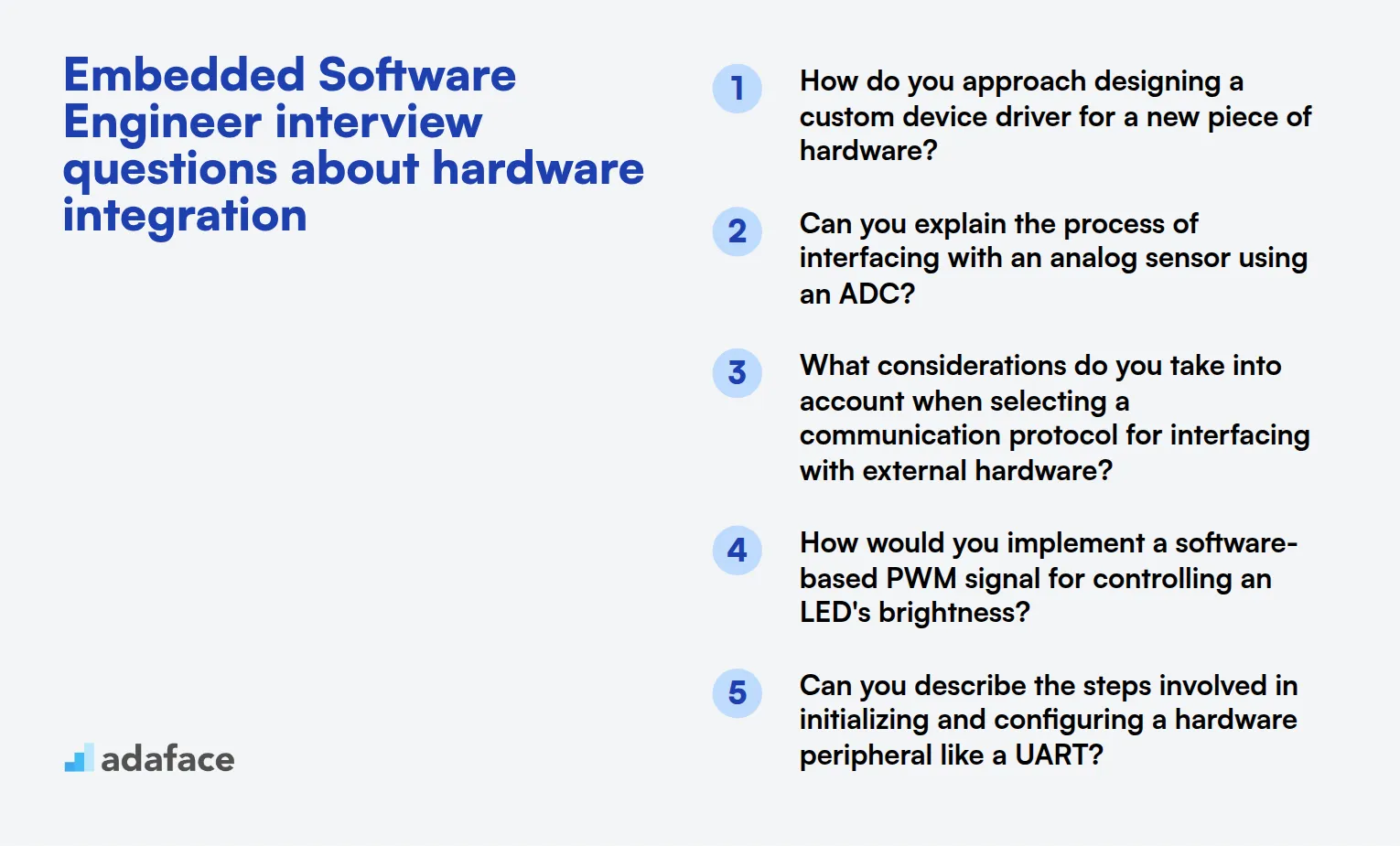
To assess a candidate's proficiency in hardware integration, use these 12 embedded software engineer interview questions. These questions help evaluate the applicant's ability to bridge the gap between software and hardware components, ensuring they can develop efficient and reliable embedded systems.
- How do you approach designing a custom device driver for a new piece of hardware?
- Can you explain the process of interfacing with an analog sensor using an ADC?
- What considerations do you take into account when selecting a communication protocol for interfacing with external hardware?
- How would you implement a software-based PWM signal for controlling an LED's brightness?
- Can you describe the steps involved in initializing and configuring a hardware peripheral like a UART?
- What techniques do you use to minimize EMI in mixed-signal embedded designs?
- How do you handle race conditions when accessing shared hardware resources in a multi-threaded environment?
- Can you explain the concept of memory alignment and its importance in embedded systems?
- What strategies do you employ to optimize DMA transfers in a resource-constrained system?
- How do you approach writing efficient interrupt service routines (ISRs) for time-critical operations?
- Can you describe a situation where you had to implement a hardware abstraction layer (HAL) and its benefits?
- What methods do you use to ensure proper timing and synchronization between software and hardware events?
10 situational Embedded Software Engineer interview questions for hiring top engineers
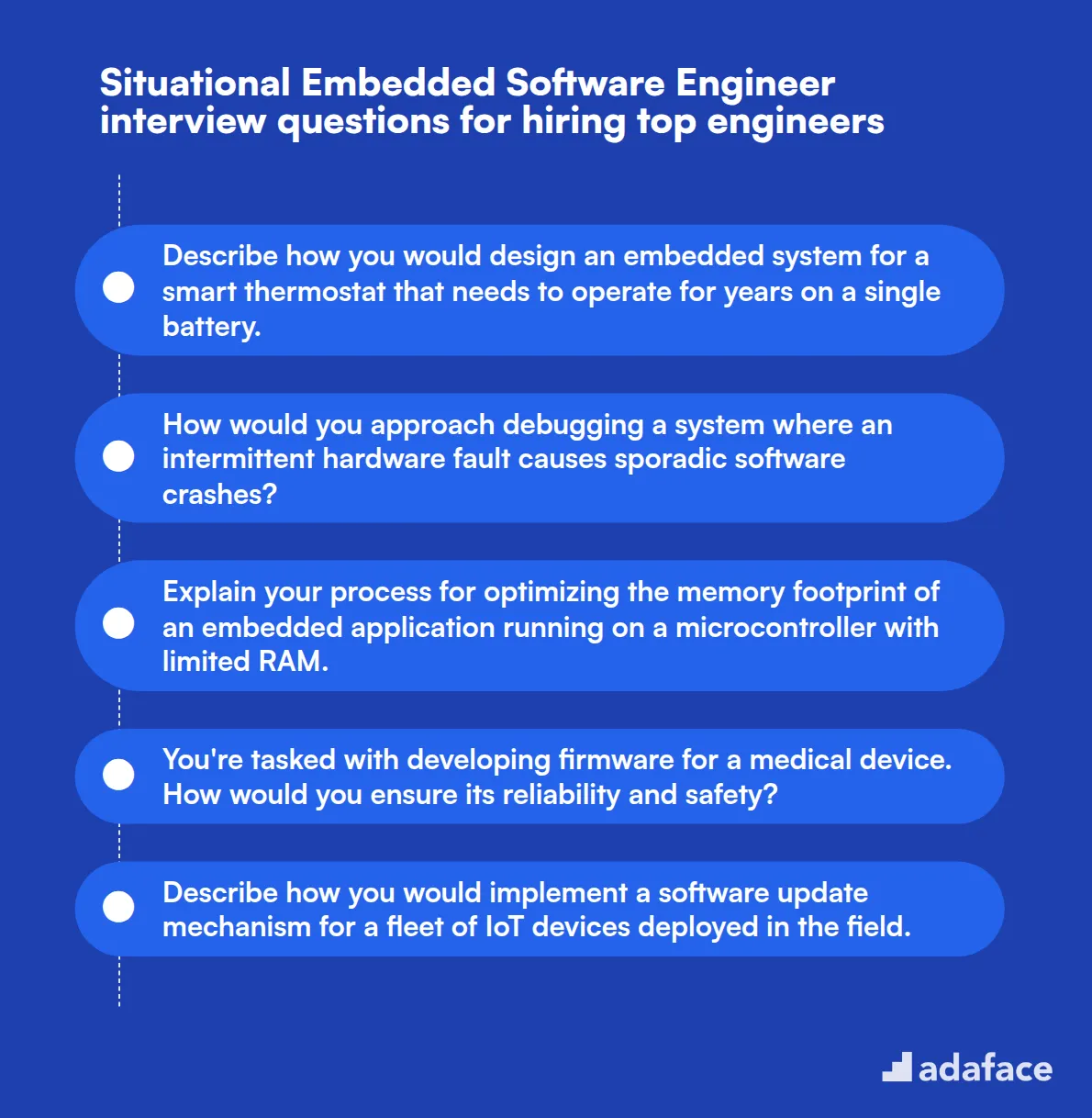
To assess a candidate's ability to handle real-world scenarios in embedded software development, consider using these situational interview questions. These questions help evaluate problem-solving skills, technical knowledge, and practical experience in embedded systems design and implementation.
- Describe how you would design an embedded system for a smart thermostat that needs to operate for years on a single battery.
- How would you approach debugging a system where an intermittent hardware fault causes sporadic software crashes?
- Explain your process for optimizing the memory footprint of an embedded application running on a microcontroller with limited RAM.
- You're tasked with developing firmware for a medical device. How would you ensure its reliability and safety?
- Describe how you would implement a software update mechanism for a fleet of IoT devices deployed in the field.
- How would you design a fault-tolerant system for a critical industrial control application?
- Explain your approach to developing a multi-threaded application for a dual-core microcontroller.
- You're working on a project that requires interfacing with a new, poorly documented sensor. How would you proceed?
- Describe how you would implement a custom bootloader for a microcontroller-based system.
- How would you optimize the power consumption of an always-on wearable device?
Which Embedded Software Engineer skills should you evaluate during the interview phase?
While it's impossible to assess every aspect of a candidate in a single interview, focusing on core skills is crucial for evaluating Embedded Software Engineers. These key competencies form the foundation of their expertise and indicate their potential for success in the role.
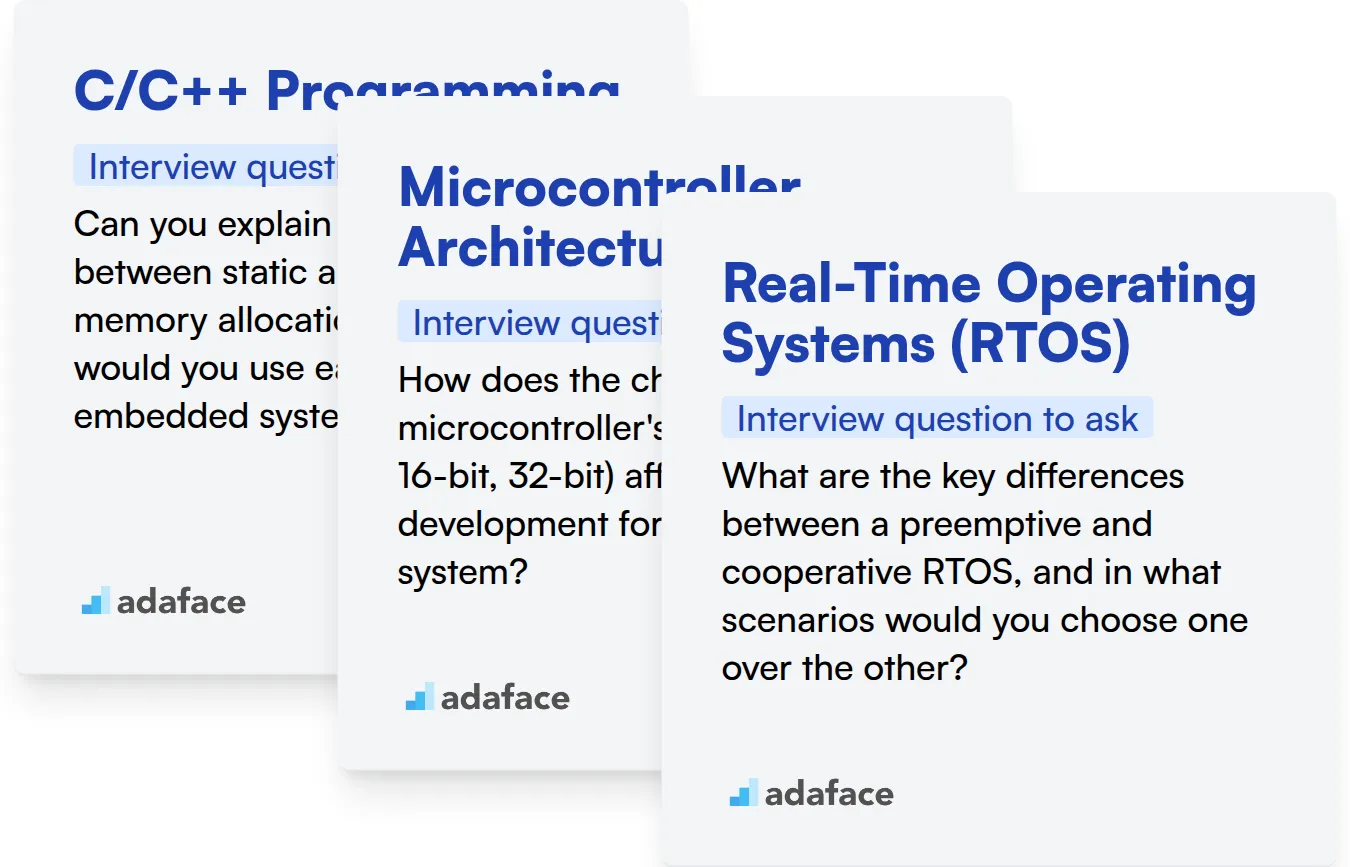
C/C++ Programming
C and C++ are the primary languages used in embedded systems development. Proficiency in these languages is fundamental for writing efficient, low-level code that interacts directly with hardware.
Consider using an Embedded C online programming test to assess candidates' C programming skills. This can help filter out candidates with strong foundational knowledge.
To evaluate C/C++ skills during the interview, you can ask targeted questions about memory management, pointers, and embedded-specific concepts.
Can you explain the difference between static and dynamic memory allocation in C, and when would you use each in an embedded system?
Look for answers that demonstrate understanding of memory constraints in embedded systems, stack vs heap allocation, and potential issues like fragmentation.
Microcontroller Architecture
Understanding microcontroller architecture is essential for embedded software engineers. It enables them to write optimized code and effectively utilize hardware resources.
To assess this skill, ask questions about specific microcontroller features and how they impact software design.
How does the choice of a microcontroller's bit width (8-bit, 16-bit, 32-bit) affect software development for an embedded system?
Look for answers that discuss trade-offs between processing power, memory usage, power consumption, and code complexity across different microcontroller architectures.
Real-Time Operating Systems (RTOS)
Knowledge of RTOS principles is crucial for developing complex embedded systems. It ensures efficient task scheduling and resource management in time-critical applications.
Ask questions about RTOS concepts to gauge the candidate's understanding of embedded system design principles.
What are the key differences between a preemptive and cooperative RTOS, and in what scenarios would you choose one over the other?
Evaluate responses for understanding of task priorities, context switching, determinism, and the impact on system responsiveness and resource utilization.
Recruit Top Embedded Software Engineers with Adaface's Skill Tests and Interview Questions
If you're on the hunt for an embedded software engineer, verifying their skills is key to finding the right fit for your team. Ensuring candidates possess the necessary expertise is the first step towards successful hiring.
The most effective way to assess these skills is through targeted skill tests. Consider using our Embedded C Online Test or our array of C Online Tests to gauge candidates' proficiency.
Once you administer these tests, you can easily shortlist the top performers and invite them for interviews. This initial screening process helps in selecting candidates who truly stand out.
To take the next step, you can sign up with Adaface or explore our online assessment platform for more details on how we can assist you in hiring the best talent.
Embedded C Online Test
Download Embedded Software Engineer interview questions template in multiple formats
Embedded Software Engineer Interview Questions FAQs
An Embedded Software Engineer should have skills in programming languages like C/C++, knowledge of microcontrollers, real-time operating systems, hardware interfaces, and debugging techniques.
Use situational questions, coding challenges, and ask about past projects to assess a candidate's ability to solve complex embedded systems problems.
Key topics include real-time systems, hardware integration, memory management, interrupt handling, and embedded design patterns.
Ask about specific projects they've worked on, platforms they're familiar with, and how they've overcome challenges unique to different embedded environments.

40 min skill tests.
No trick questions.
Accurate shortlisting.
We make it easy for you to find the best candidates in your pipeline with a 40 min skills test.
Try for freeRelated posts
Free resources




